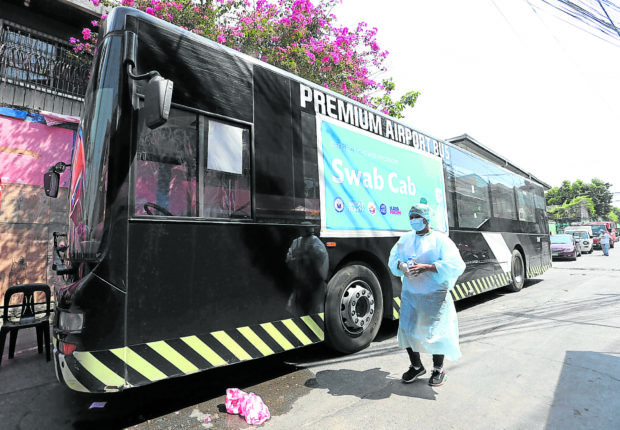
BUS IN SEARCH OF BUG Vice President Leni Robredo also rolled out the Swab Cab in late March to provide free antigen testing for residents especially in Metro Manila’s COVID-19 “hot spots.” The mobile facility can conduct up to 1,500 tests per trip. —LYN RILLON
MANILA, Philippines — People cooped up at home due to the community quarantine but in need of “tulong” (assistance) or “konsulta” (consultation) for their medical problems need only to type either of those Filipino words on the Bayanihan E-Konsulta page on Facebook to get some help.
The Office of the Vice President (OVP) has opened an online channel offering the service to residents of Metro Manila and nearby provinces. Available on Facebook’s free data service, the platform will entertain medical queries not just limited to COVID-19 concerns.
“The target patients here are those who cannot access existing platforms because they either can’t afford to pay the fee or have no internet access,” Vice President Leni Robredo said during the launch early this week.
After typing “tulong” or “konsulta” on the platform, the users — or patients — will be given a questionnaire where they can be more specific about their concerns, and to determine whether they need emergency care right away or just a consultation in the meantime.
For patients in need of emergency care, the teleconsulation service will help them access the One Hospital Command Center, the referral network set up by the Department of Health.
“The [platform] has limitations, … because it is not in our mandate to provide a hospital room. We do have an existing protocol to refer patients to [the] One Hospital Command Center,” Robredo said. “Those who will greatly benefit here are outpatients who do not need hospitalization, those who are isolating at home but need to talk to a doctor.”
Volunteers
According to the OVP, about 2,300 people signed up — 500 of them doctors — within 24 hours after the project launch and a call for volunteers was made. The volunteers were divided into groups and given an orientation on the protocols for the service.
Nonmedical volunteers are tasked with scheduling the consultation and connecting patients to the doctors.
The cases will be categorized depending on their urgency: Code Red cases will receive immediate attention, while Code Yellow cases will be attended to within the day.
Swamped by queries on its first day, the Bayanihan E-Konsulta page experienced technical difficulties, but the service was later restored. It now runs from 7 a.m. to 9 p.m. daily, the OVP said.
Full capacity
Robredo said the OVP came up with the project as public and private hospitals reached full capacity last week and her office received a barrage of phone calls and messages from people looking for hospitals that could still accommodate suspected or confirmed COVID-19 cases.
“[We asked ourselves] how else can we help?” she said.
After several meetings held during Holy Week, the OVP decided to add e-consultation among the services it could provide, given its limited resources. “This is our attempt to decongest the hospitals and to ensure that even those at home will receive medical help. And the No. 1 intent is to lighten the load of those in challenging situations.”
‘Care kits’
Robredo on Friday said her team did not expect the high number of patients who would seek help through the platform during its first two days in operation.
“One of our realizations since Wednesday was that most of our patients who are COVID-19 positive and doing home isolation are relieved that they get to talk to a medical doctor. But when doctors start asking them to monitor their symptoms and report them, they do not have thermometers and oximeters to check their temperature and oxygen level,” she said in a Facebook post.
The OVP thus tweaked the project to include the provision of such supplies.
Once a needy patient’s address is confirmed, a “care kit” will be on its way, containing, among others, a digital thermometer, face mask, pulse oximeter, disinfectant, alcohol and waste disposal bag, complete with instructions. Pulse oximeters in particular have lately been out of stock in many stores.
The kit also includes medicines — nasal decongestant, paracetamol, carbocisteine for cough with phlegm, cetirizine for allergy, butamirate for dry cough and oral rehydration salts—as well as hexetidine gargle for sore throat and vitamin supplements.
“The contents of the kit are borne out of the advice of the doctors we are consulting. We originally wanted to include disposable gloves but the prices suddenly increased that it no longer fit the budget. Once [the prices] stabilize we will include gloves again,” the vice president said.
On March 30, the OVP rolled out a mobile COVID-19 testing center—the “Swab Cab”—which made its first stop in Malabon City, one of the areas in Metro Manila recently listed as having a “critical risk level” of infections. The Swab Cab bus covered at least five “hot spots” on its pilot run, namely Barangays Longos, Potrero, Tonsuya, Tañong and Flores.
‘Swab Cab’
It administers free antigen tests, with the results ready after 15 minutes, and can conduct up to 1,500 tests per trip.
Among its first volunteers was Dr. Tricia Robredo, one of the Vice President’s daughters, who passed the medical board exam in November last year.
Those who test positive in the antigen test will be made to undergo RT-PCR (real-time reverse transcription-polymerase chain reaction) testing, which the government considers the “gold standard,” or the most reliable way to detect the virus that causes COVID-19.
When the Swab Cab returned to Malabon on April 6, the OVP also handed out bags of rice to residents who came to be tested. Those who tested positive were assured of aid for their families.
The OVP also converted a local public school into an isolation center, setting up tents for the occupants’ privacy.